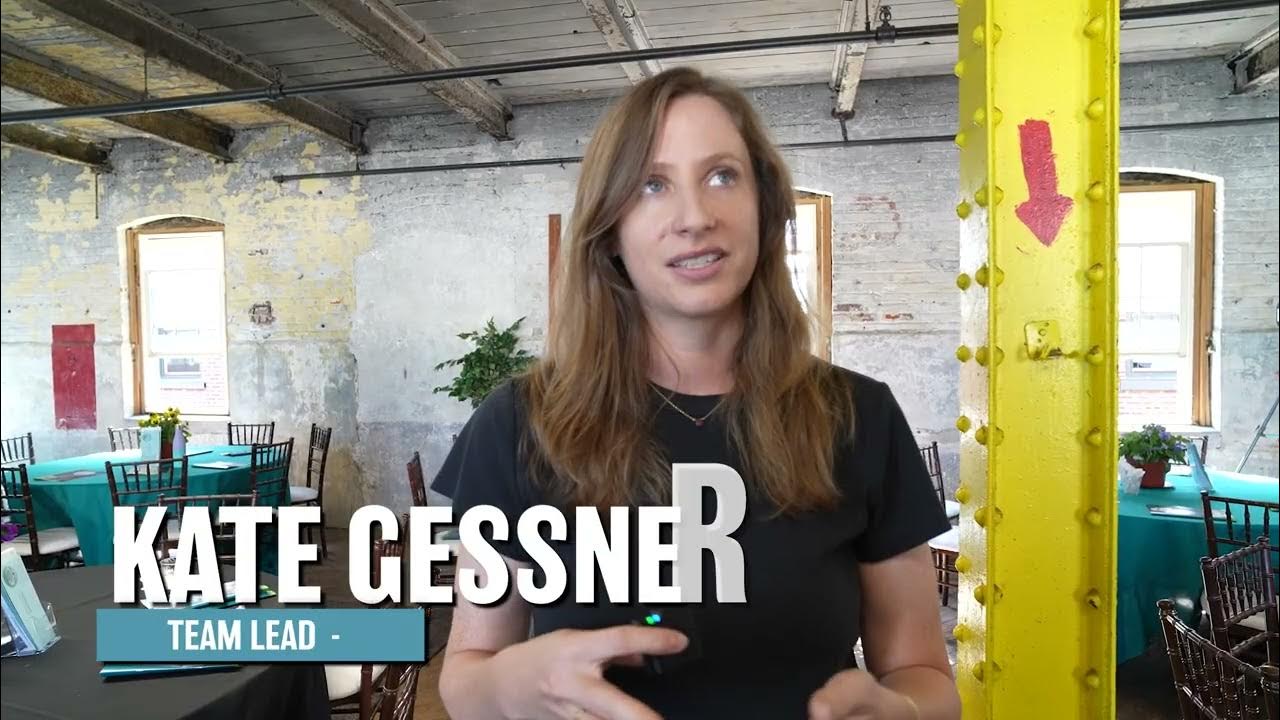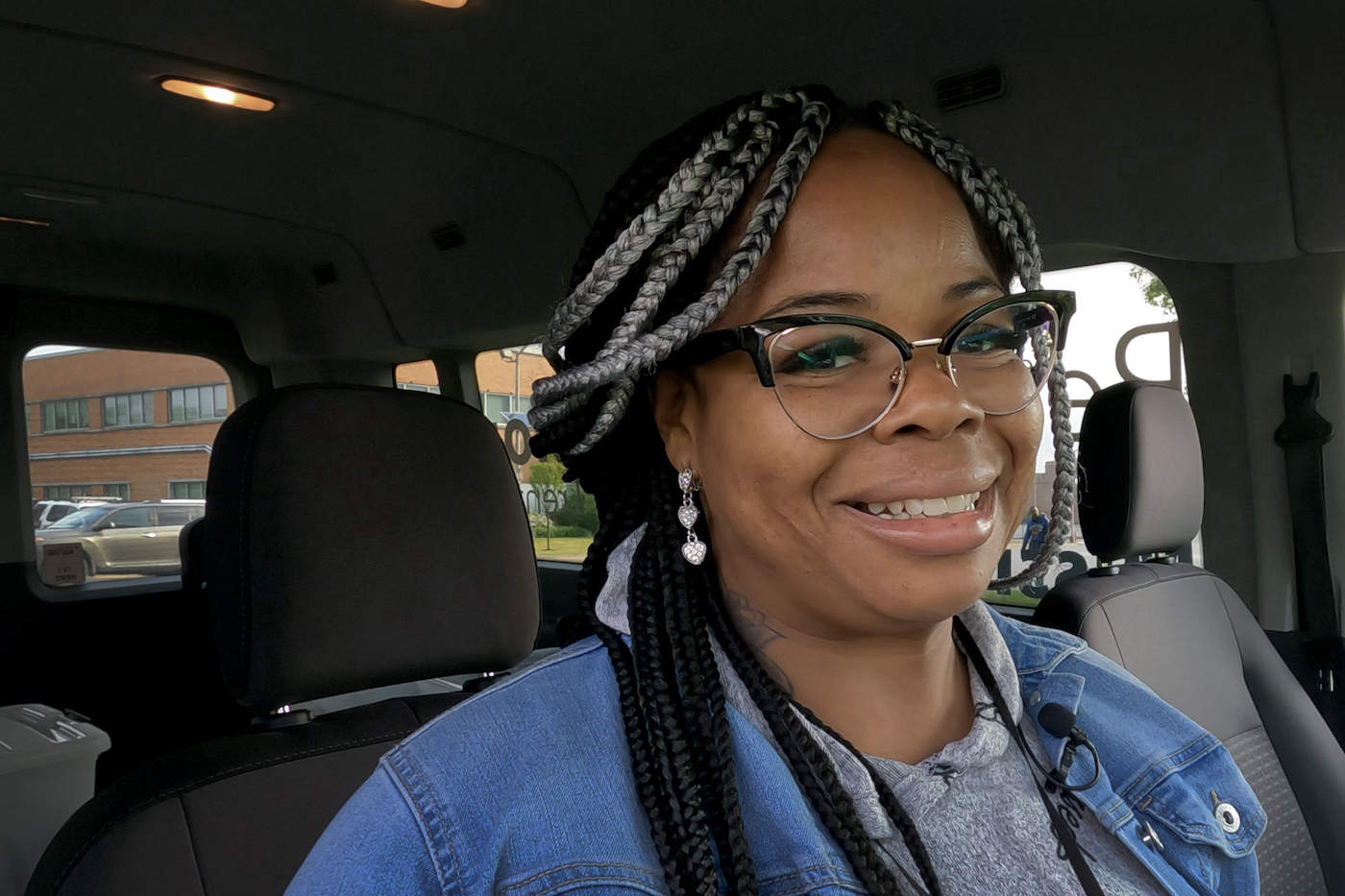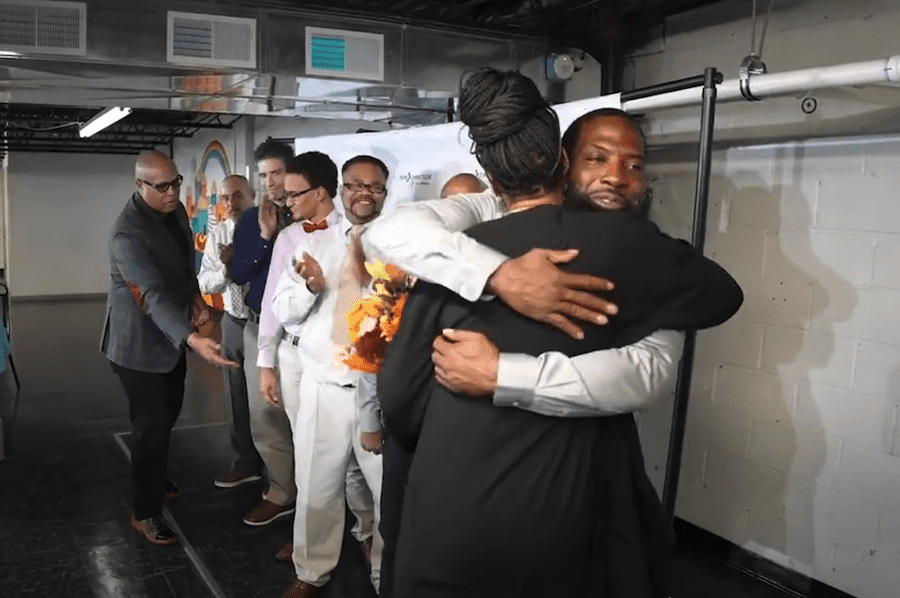Story and photos by Michael Mancuso
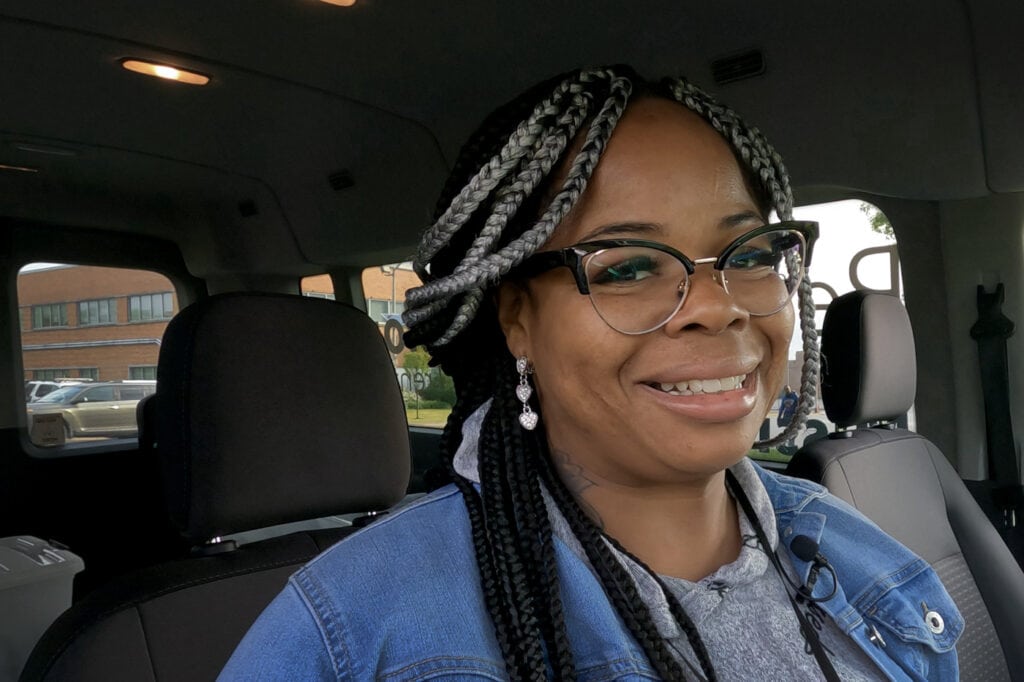
Early on a recent, damp Thursday morning, a van slowly makes its way down a forbidding, narrow alley in Trenton’s South Ward. The van stops where a lone man is randomly pacing behind a garage, periodically hunching over, emitting non-verbal sounds.
He wears droopy camo cargo pants and a trash bag over his upper body as protection against the rain, but no hat.
The Mission’s Peer Recovery Specialists Chalia Perry and Jose Caraballo exit the van to offer assistance and support in the form of clothes, a bite to eat, a warm cup of coffee, a caring conversation; and, if he is ready, medication to help him recover, access to healthcare, and shelter from his personal storms.
Chalia (pronounced shu-LEE-uh) approaches the man and talks in a kind voice calling him by name. “Jay, you want gloves?” “Yes, please.” he responds, taking them from her outstretched hands. “Thank you.”
He retreats and clutches the coffee in one hand, seemingly unaware as some of it accidentally spills when the cup tilts as he hunches over again. He won’t say much more.
A rooster crows in a nearby backyard.
“I hate fentanyl.” Chalia says wistfully. “That makes people react so…” she gestures but doesn’t finish the sentence. “That drug, it’s, it’s the worst.”
Chalia and Jose have firsthand knowledge of what Jay and the many other people they minister to through The Mission Outreach initiative are dealing with. They are both in recovery themselves.
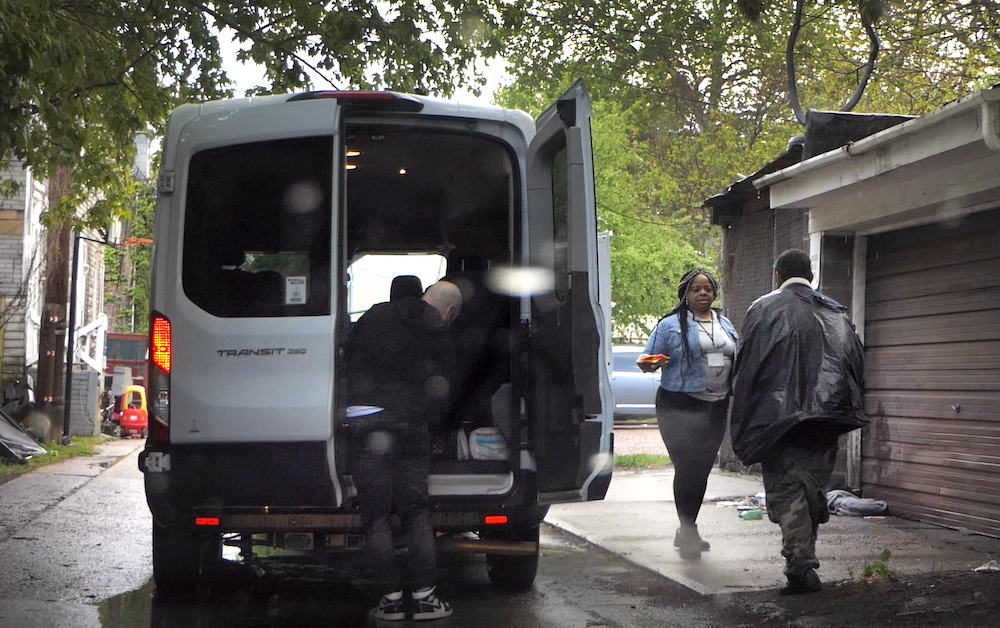
This Mobile Outreach Project is the creation of a unique partnership between Catholic Charities, Henry J. Austin Health Center, Iron Recovery & Wellness Center, and The Mission, made possible by a generous grant awarded to The Mission by the Mercer County Office on Addiction Services.
“Our mission is to show people that somebody out here cares about what they’re going through.” Chalia said, “Especially with both of us being in recovery.
“It’s easier to know what’s going on with them because we’ve been there.”
She said it seemed like nobody cared about them when they were on the streets, feeling “all alone.”
Surgeon General Vivek Murthy recently released an advisory titled “Our Epidemic of Loneliness and Isolation” stating that “Loneliness and isolation represent profound threats to our health and well-being.” He added, “The mortality impact of being socially disconnected is similar to that caused by smoking up to 15 cigarettes a day, and even greater than that associated with obesity and physical inactivity.”
If loneliness and isolation are a physical and mental health epidemic among people living in mainstream society, how much more acute must it be for people living in tents next to railroad tracks?
“Nobody actually came in to where we were at,” Chalia said, “and we stayed in the same place every day. And that’s what they do.”
So, this is what The Mission Outreach does, goes out and meets people where they are at.
“It’s easier to know what’s going on with them because we’ve been there.”
Spending four hours in the morning, six days a week, driving to where people struggling with addiction are known to congregate in Trenton and Hamilton Township, Chalia and Jose have a purpose, but they don’t have an agenda.
Along with the personal items for physical sustenance, including Narcan, a life-saving medication that can reverse an overdose from opioids when given in time, they offer consistent concern, love and support, ever-mindful from personal experience that you can’t force people into recovery.
“Even if they’re not ready at that given moment, we’re still going to be there for them,” Jose said.
“If they feel they’re hopeless, at least we can reassure them that we’re here for them and that there’s people out there that want to help them.”
Jose and Chalia approach each situation with respectful caution.
“Some people don’t see it as a home or whatever, but that’s their home,” Chalia said. “We dare not disrespect that and as long as we respect them, they respect us and we’ve got that mutual understanding.
“Consistency is very important.”
She adds that the food they have helps people warm up to them, along with clothing, personal items, and positive human interaction.
Off Perry Street, sitting in the parked van, Chalia watches Jose walk alone down an empty trail next to the railroad tracks. Chalia praises her partner’s abilities.
“He’s really great, especially with the guys.” Jose is bilingual and that helps with their outreach. At about 50 yards out, Jose stops walking and turns.
A man named Chaz emerges from behind some trees. Then a woman named Carol. Then another man. They talk, and in a few minutes the four are walking at a leisurely pace back toward the van.
For each of these individuals, living in hidden tents off the railroad tracks near Perry Street, Chalia and Jose represent what is often the only lifeline to a better life, whenever they are ready to move towards that.
“See how they are coming out? (from behind some trees) That’s love right there. That’s love. Very hard to get that,” Jose said.
“At the end of the day, you know, we’re all the same,” he added, “once you look past whatever they’re going through.
“At the end of the day, you know, we’re all the same. I just try to give each of these individuals the hope that they can get past whatever they’re going through.“
“I just try to give each of these individuals the hope that they can get past whatever they’re going through. And who is more relatable than someone like me who has gone through it?”
As Jose and the three arrive at the van, Chalia breaks into a big smile and says of Carol, “This is my girl right here.” Carol comes in for a hug and notices the photographer. “No, I don’t want to be on film,” she says, covering her face while laughing. “Say ‘Hi!’” Chalia responds. “C’mon, you look beautiful.”
Carol quickly agrees to be on camera and talks with the writer.
“This program here is wonderful and they’re all very friendly,” she says, “and there’s people in there that I knew who were outside on the streets with me and I hung with them and now they’re clean and I’m like, so proud of them and I wish I was them.”
Carol said that unlike some of her counterparts, she has a place to stay with a roof over her head, but most of her money goes to rent.
“I couldn’t even wash clothes,” she said while devouring a sandwich she had just received. “I’ve been out here in the same outfit for three days. And she (Chalia) just gave me an outfit so I can go home and take a shower and put something clean on and feel like a human again, because I feel nasty and dirty.
“And when I feel like that I don’t want to do nothing and I sleep all day and I think it’s part of a depression I’m in because I started using again and I was clean, and I’m mad at myself.”
Carol said she will soon need surgery and has asked Li-Li (her name for Chalia) to accompany her because “I don’t want one of these people that’s using to come with me.
Carol said she even knows Chalia’s mom. “Li-Li and me go back!”
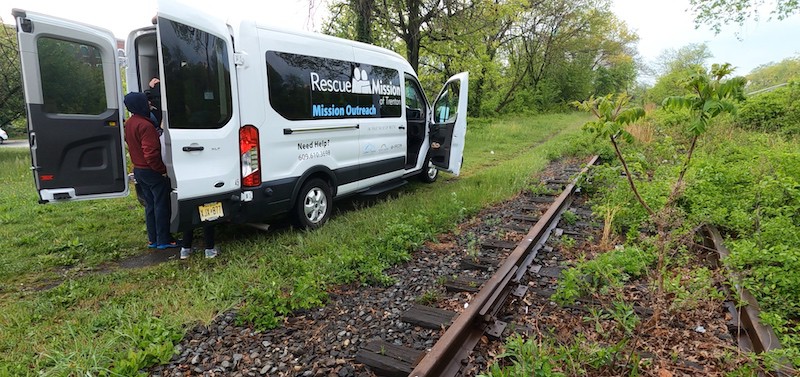
Chaz said he has been living on the streets for almost four years. He said during that time he has been pistol-whipped and robbed at gunpoint and he also said that his girlfriend of 17 years, Wanda, “died on my chest, from an overdose of fentanyl.
“The Rescue Mission means a lot to me because it’s people giving back to people that don’t have much,” he said.
Chalia and Jose make another stop on a forgotten street in the South Ward. Chalia gets out of the van and knocks on the door of a dilapidated house with obscene graffiti scrawled all over its side.
Getting no answer, she returns to the open back door of the van, still calling out.
A woman opens the door, peeks out and says, “Oh, it’s raining.”
Chalia approaches her with a cup of coffee in one hand and a bag of supplies in the other and finds there are more people inside.
She gets more cups of coffee, then standing at the open doorway, Chalia calls them by name, asking for their birth dates.
“Y’all making me work in the rain,” Chalia says. “Somebody ain’t going to come out here with me?” she asks the people huddled inside, while respecting their space, never entering the house herself.
The words stand out starkly as a metaphor for the work Jose and Chalia are engaged in, working “in the rain” and asking people to voluntarily take the steps necessary to join them.
From the open door’s threshold, recording on her clipboard the names and birthdates of the people on the other side, Chalia says, “All right. I love you all.” and blows them a kiss before making her way down the steps and back to the van to the next stop.
This is not easy work that can be done by just anyone, and it’s clearly not work for someone just looking to collect a paycheck, or for those interested in comfortable working conditions.
This is a calling. And Jose and Chalia are on a mission.
Since beginning last August, The Mission’s Outreach initiative has provided coffee and food 4,342 times, items of clothing, 580 Narcan kits, brought 21 previously unsheltered individuals to The Shelter, provided medical treatment for 24 individuals, and helped 50 individuals receive treatment for addiction.
